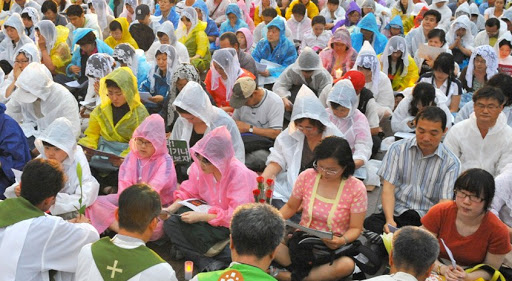One of the most indelible images from the recent papal trip to South Korea came when Pope Francis met with a group of former “comfort women,” the label offered to women conscripted into sexual slavery during World War II.
The Korean government estimates that some 200,000 women from Korea and other Asian nations were enslaved during the Japan’s 1910-1945 colonial rule of Korea. Japan says the number is much lower and that the women freely volunteered themselves to assist the Japanese army. While South Korea officials have repeatedly called on Japan to admit the abuse and offer compensation, Japan maintains the issue was settled in 1965 through a broader bilateral agreement.
The diplomatic issue has divided Seoul and Tokyo for several decades.
The Pope met with seven comfort women, all frail and of advanced age, during his last day in South Korea on Aug. 18.
Pope Francis, visibly moved by the encounter, spoke of the women’s “dignity” despite their suffering.
“These women were used, they were enslaved, and these are acts of cruelty,” the Pope told reporters after the private meeting with the women.
One victim, Kim Bok-dong, 88, asked Pope Francis to urge the Japanese government to apologize to victims and resolve remaining issues, reported Catholic News Service.
Kim gave the Pontiff a gold-colored metal butterfly pin, a symbol of the women’s call for justice.
Cristian Martini Grimaldi, a columnist for “L’Osservatore Romano” and author of “Christians in Korea” and the newly released, “I am Francis,” noted that the Pope “promised to support them in this battle for justice.”
“I believe that a future visit to Japan by Pope Francis will put even more pressure on the Japanese government to settle this issue once and for all,” Grimaldi told Aleteia.
Since 1992, South Korea’s remaining “comfort women” have demonstrated every Wednesday in front of the Japanese embassy in Seoul, seeking reparations and a formal apology from the Japanese government. The protests have been recognized by the Guinness Book of World Records as the longest-running event in the world based on a single theme.
The women were kidnapped or tricked into sexual slavery, many taken as young girls. Promised a factory job, the women would find themselves transported to a “comfort station” in a foreign land.
“Here, the young girls were subjected to medical examinations to test their health, or for the absence of venereal diseases and even to check their virginity,” Grimaldi said.
In 1993, the Japanese government issued a statement that said the Japanese army had established a network of brothels to service its soldiers, but stopped short of admitting using coercion in recruiting women.
However, in June the Japanese government said the 1993 apology for the wartime sexual slavery of Korean women was the result of a political compromise between the two countries, stalling further talks.
“This is the central issue: for the Korean government these women were coerced into a brutal form of slavery, they were not volunteering for a job abroad, much less they were seeking to sell their body for the pleasure of the enemy’s army,” he said.
Grimaldi has attended some of the demonstrations and met with the victims. On one occasion, he spoke with an 85-year-old woman who was taken by the Japanese army when she was 13.
“She traveled all over Asia to serve the Japanese military, in China, Malaysia, Hong Kong, Singapore. At the end of the war, she was left with no money nor a place to stay. Only when she met American soldiers she was offered the help to get the documents and money she needed to return to Korea,” he said.
“I have to add that by looking at these women straight in their eyes you couldn’t tell what they went through, the incredible sufferings they endured.
“They retain indeed, as Pope Francis noted, an astonishing inner strength and an incredible dignity,” Grimaldi said.
Stephen Steele is a reporter withwww.ucanews.com is based in Bangkok, Thailand.

